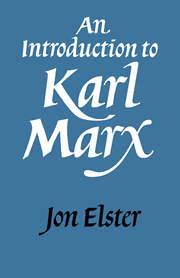Book contents
Summary
INTRODUCTION
Marx found three main flaws in capitalism: inefficiency, exploitation, and alienation. These play two distinct roles in his theory. On the one hand, they enter into his normative assessment of what is wrong with capitalism and, as the other side of that coin, what is desirable about communism. On the other hand, they are part of his explanation of the breakdown of capitalism and the subsequent transition to communism. Clearly, the two roles are related. By and large, the various reasons why capitalism ought to be abolished also explain why it will be abolished. They receive, however, somewhat different emphases in the different parts of Marx's theory. The general theory of modes of production assigns the most important role to inefficiency in explaining why one mode is replaced by another. The theory of class struggle accords the central place to exploitation. The relation between these two explanatory theories will concern us later. In the normative theory, alienation is the most important concept. Marx valued communism above all because it would abolish alienation, in several senses of that term.
Does alienation play a role in the explanation of the breakdown of capitalism? It is not clear that it does, or that it can do. Alienation can be described, very broadly, as the lack of a sense of meaning. As such, it does not imply the sense of a lack of meaning. Only the latter, however, could provide a motivation for action.
- Type
- Chapter
- Information
- An Introduction to Karl Marx , pp. 41 - 59Publisher: Cambridge University PressPrint publication year: 1986



